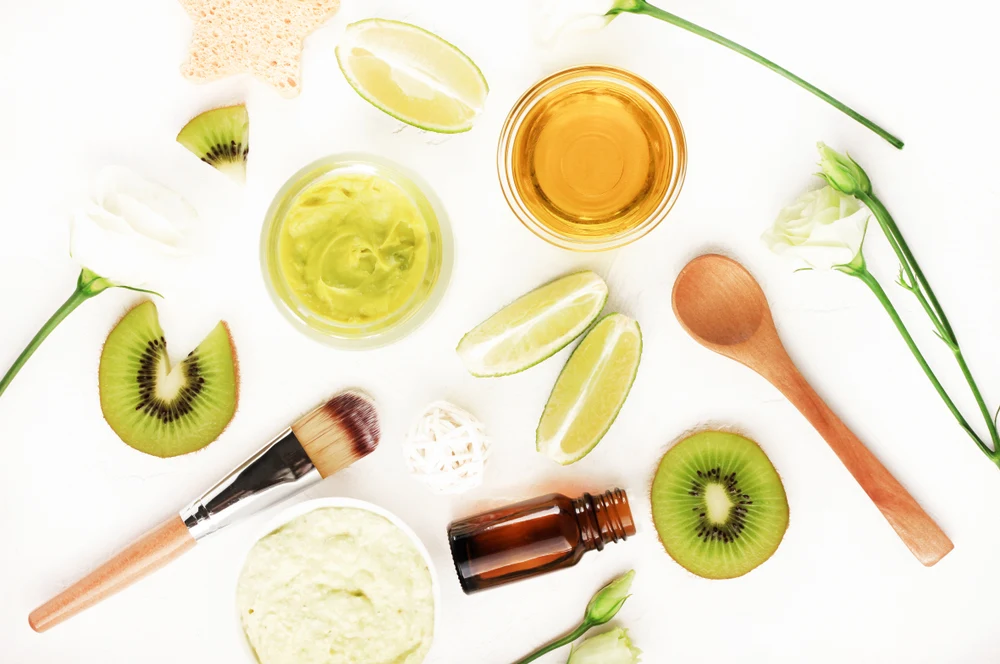Have no fear! We’re here to tell you everything you need to know about dealing with sensitive skin: what to do, what not to do, and what ingredients to look for.
What exactly is sensitive skin?
Sensitive skin is actually quite an ambiguous term, comprising a range of skin issues from severe allergies to genetic conditions such as eczema or rosacea. Sometimes, what people describe as “sensitive skin” is actually just a reaction to a specific product or ingredient, rather than their actual skin type.
Sensitive skin doesn’t have a “one size fits all” definition, but can describe skin that is prone to redness or irritation, has dry patches or broken capillaries, is sensitive to UV rays, reacts poorly to bad weather, or breaks out easily.
How to help sensitive skin
1. Simplify your routine
After walking through the skincare aisle (or watching an influencer’s routine on Instagram), it’s easy to feel as though your skincare routine needs to include at least twenty different steps in order to be effective.
For people with sensitive skin, the most effective care is often the most simple: cleansing, moisturizing, and applying a sunscreen for added protection.
2. Focus on strengthening your moisture barrier
Your skin is an incredibly effective and adaptable protective barrier, but unspecialized care, harsh exfoliating products, and over-cleansing can compromise its resilience. For those with sensitive skin, maintaining a healthy moisture barrier is essential.
3. Avoid harsh exfoliants and over-cleansing
If there’s a single phrase that sums up sensitive skin treatment, it’s this: be gentle. Sensitive skin needs time to strengthen itself, and harsh exfoliators and scrubs will hinder this process — even if they make your skin feel good in the short term.
Instead of scrubs and exfoliators, choose a gentle, non-foaming cleanser — and wash your face with tepid water instead of hot. And remember, don’t overdo it! Over-cleansing can not only irritate your skin, but also damage your moisture barrier and strip away natural oils that your skin needs.
What’s the difference between double-cleansing and over-cleansing?
Over-cleansing is different from double-cleansing (hint: we like double-cleansing!) A double-cleanse is exactly what it sounds like — two separate cleanses, one right after the other. The first cleanse removes makeup, SPF, oil, and sweat from the surface of your face, while the second gets down to the nitty gritty of cleaning out the impurities from your pores. Over-cleansing, on the other hand, refers to cleansing too often (e.g., any time your face starts to feel a little oily throughout the day), which can harm the skin’s moisture barrier and cause irritation. A cleanse (or double-cleanse) in the morning, and another at night, is all you need.
4. Patch-test new sensitive skin products
Introducing new products to your sensitive skin is kind of like introducing yourself to a new pet — you have to do it carefully, to make sure they’re friendly. If your products don’t like you, they may cause irritation or an outbreak that could actually worsen your skin’s sensitivity.
To patch-test, apply a small amount of the new product on your skin and leave it for 24 hours. If it doesn’t cause irritation (yay!), you should be able to continue using it.
Patch-testing will also help you identify your triggers, or ingredients that are problematic for your skin. Keep track of which products irritate your skin and compare them, looking for ingredients they have in common. Yes, this is a bit of work, but it’s worth it for happy skin!
5. Keep showers short, cool, and effective
Sensitive skin doesn’t exist only on your face — it’s important to treat sensitive skin on your body gently, too.
A long, hot shower may feel great, but taking shorter showers (under ten minutes) with tepid water is much gentler on your skin. Avoid using loofahs or rough exfoliating brushes, which can irritate your skin. And don’t forget to lock in the moisture after your shower with a hydrating body moisturizer.
What to avoid
Sensitive skin varies from person to person, but there are a few things that everyone with sensitive skin should avoid.

Sun
Sensitivity to the sun and UV rays is one of the main indicators of sensitive skin. While everyone and every skin type should wear sunscreen every day — yes, every day! — sun protection is even more important for those with sensitive skin.
To combat the sun’s harmful rays, wear a broad-spectrum sunscreen with SPF 30 or higher, and avoid synthetic sunscreens — mineral sunscreens like titanium dioxide and zinc oxide are much kinder to sensitive skin.
Fragrance
For sensitive skin, fragrance is a big no-no. This includes perfumes, essential oils, and undisclosed fragrance (which just means that a manufacturer doesn’t have to tell you which chemicals make up the fragrance). Skin is great at hiding when it’s unhappy — so even if you don’t see immediate irritation after using products with fragrance, damage can occur deep within the skin that won’t manifest itself until years later, when it suddenly becomes red, inflamed, and easily irritated.
For products that do not stay on your face long, such as a cleanser, avoiding fragrance is less important; but be sure you are always using fragrance-free moisturizers and serums.
Irritating Ingredients
Fragrance isn’t the only thing on the ingredient list to watch out for — keep an eye out for all types of irritating ingredients. Sulfates, alcohol, preservatives such as parabens and methylisothiazolinone, chemical sunscreens, dyes, and even essential oils can cause dryness, irritation, and allergic reactions. Make a habit of reading the ingredients, and look for hypoallergenic products, like Aveeno® Calm + Restore™ Oat Gel Moisturizer.
Ingredients to look for
The following ingredients are especially good for sensitive skin:
Feverfew extract delivers high antioxidant and anti‐irritant benefits, and significantly reduces the appearance of redness and irritation.
Prebiotics such as oats encourage the growth of healthy microorganisms on the skin and strengthen its natural defense barriers.
Colloidal oatmeal helps fight dry skin by maintaining the skin’s moisture barrier, or stratum corneum, which keeps the good things in and the bad things out. Colloidal oatmeal is made by grinding oat grain into a fine powder.
Building your perfect sensitive skin routine
With all of the above to consider, how do you build a simple, effective routine that gives your skin the soothing, strengthening, irritation-free care it deserves? Formulated with the power of prebiotic oat and feverfew — and free of irritants, dyes, and chemicals — New Aveeno Calm + Restore™ instantly soothes skin’s moisture barrier for stronger, more resilient skin over time. Here are a few products to consider as you build a routine for sensitive skin:
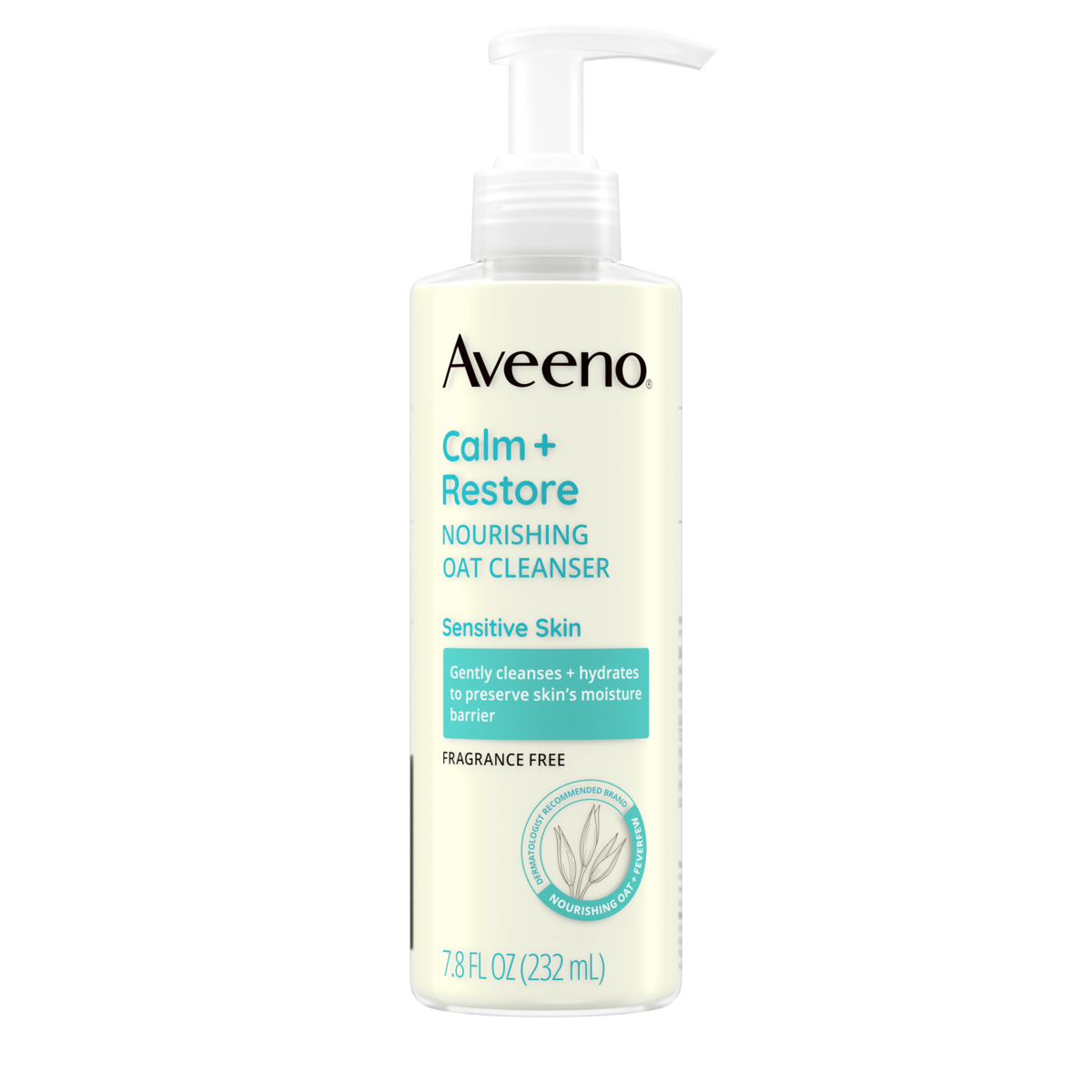
Aveeno® Calm + Restore™ Nourishing Oat Gel Cleanser
This fragrance-free cleanser uses soothing prebiotic oat to gently remove dirt, oil and makeup, while strengthening skin’s moisture barrier.
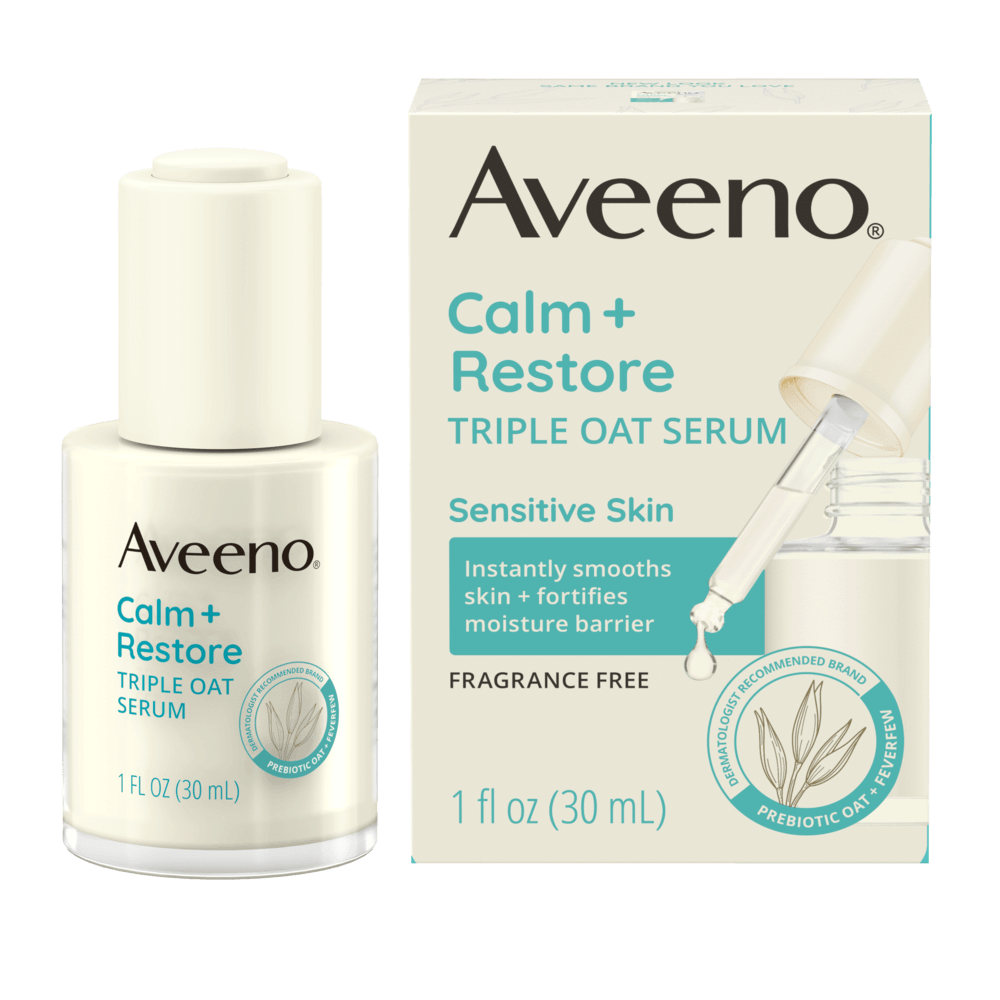
Aveeno® Calm + Restore™ Triple Oat Serum
Using the soothing, hydrating power of prebiotic oat and calming feverfew, this serum is perfect for irritated, dry, or sensitive skin. It’s free of fragrances, dyes, and irritants, and contains hydrating glycerin to keep your skin plump and fresh.
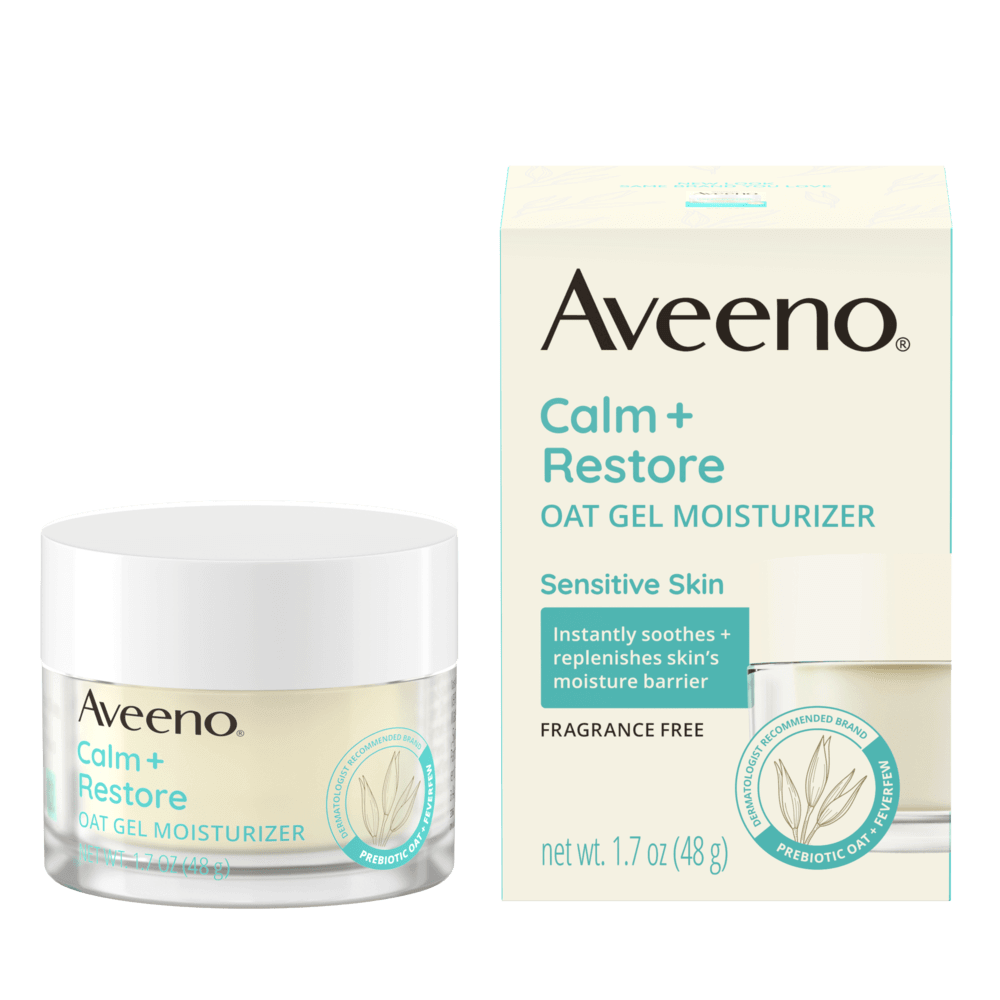
Aveeno® Calm + Restore™ Oat Gel Moisturizer
This hypoallergenic moisturizer for sensitive skin is formulated with nourishing prebiotic oat and soothing feverfew, and has a lightweight texture that’s free of irritants, dyes, and fragrances.
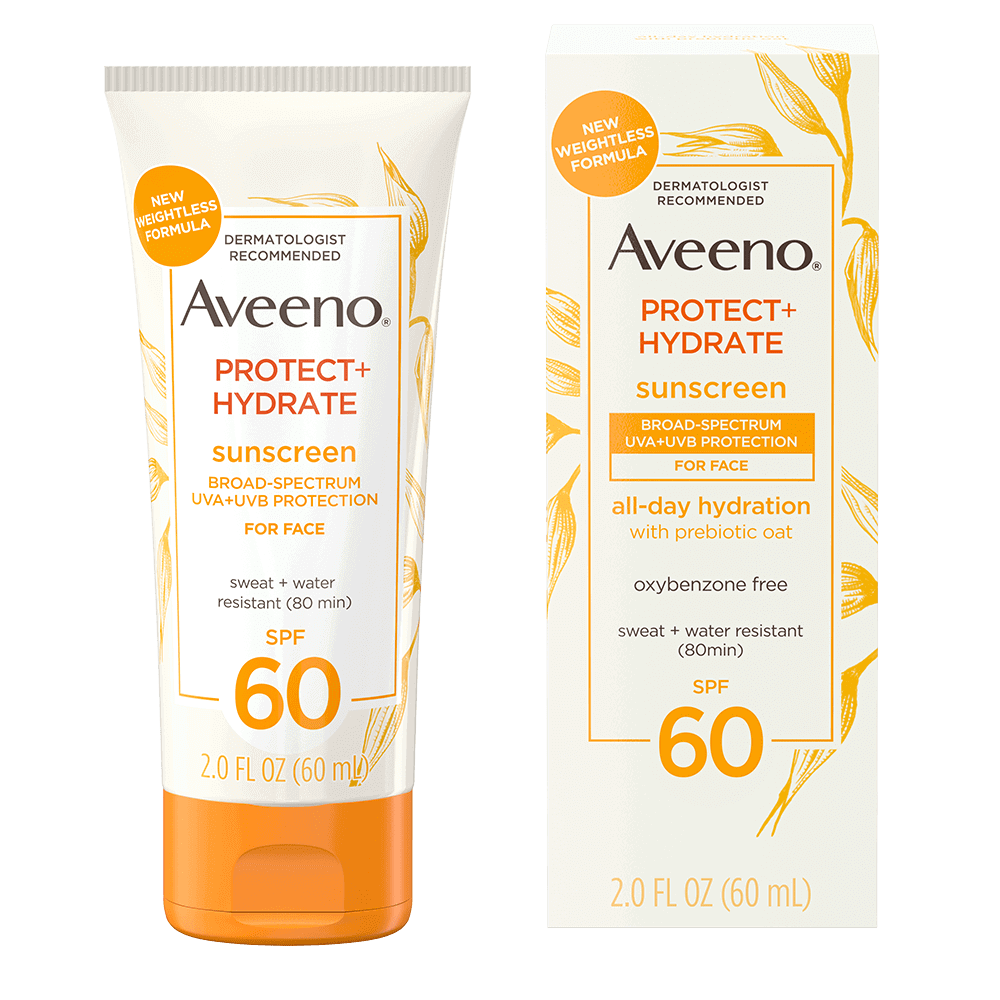
Aveeno® Protect + Hydrate Sunscreen Broad Spectrum Face Lotion SPF 60
This hypoallergenic moisturizer for sensitive skin is formulated with nourishing prebiotic oat and soothing feverfew, and has a lightweight texture that’s free of irritants, dyes, and fragrances.
Summing it up
To help soothe, protect, and strengthen your sensitive skin, 1) be gentle, 2) read ingredient lists, and 3) become best friends with your sunscreen. Above all, remember that sensitive skin is different for everyone, and what works for someone else may not work for you. It may take some experimenting to find the right combination of ingredients, products, and practices for happy, healthy skin — but the results will be well worth the time and effort.




